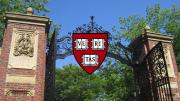The College has admitted 1,968 of 57,435 applicants to the class of 2025 (745 of whom were admitted through early action in December). The 3.4 percent admit rate is the lowest in College history, down more than a percentage point from 4.9 percent last year—the arithmetical result of an enormous rise in the applicant pool, up more than 17,000. That is consistent with a nationwide surge in applications to the most selective universities during the coronavirus pandemic, when many institutions, including Harvard, made standardized tests (the SAT and ACT) optional. MIT, for example, reported a 66 percent increase in applications this year—from 20,075 to 33,240—and accepted just 4.0 percent of the pool into its 2025 class.
Looking ahead to next year, Harvard has already announced that the SAT and ACT will remain optional for applicants to the class of 2026. “We will continue to review how the temporary changes to our application requirements impact the admitted class,” said William R. Fitzsimmons, dean of admissions and financial aid, in a statement, “and we will work hard to ensure that our many digital outreach initiatives encourage students to see themselves at Harvard no matter where they come from.”
Even though 340 members of the class of 2024 deferred their arrival for a year, only 12 fewer students than last year were admitted to the class of 2025 (though not all accepted students will choose to attend). The likely inflated number of undergraduates on campus this fall—when Harvard is expecting a full in-person return—may leave the College unable to guarantee conventional housing for juniors and seniors.
First-generation college students represent 20.7 percent of the admitted class, up from 19.4 percent last year, and about 20.4 percent of those admitted qualify for federal Pell grants (up from 19 percent last year). Among the pool of accepted students, 18 percent identify as African American/Black (up from 14.8 percent), 27.2 percent as Asian American (up from 24.5 percent), 13.3 percent as Latinx (up from 12.7 percent), 1.2 percent as Native American (down from 1.8 percent), and .6 percent as Native Hawaiian (up from .4). Women account for 52.9 percent of the total class, and international students comprise 12.2 percent.
The University announcement also highlighted its recruitment of veterans and students interested in the military: 19 veterans were admitted, and 40 admits expressed interest in ROTC. “The college has benefited greatly from the increase in military veterans applying to and enrolling on our campus,” said Marlyn McGrath, director of admissions. “These members of our classes offer unique perspectives that enhance campus diversity and learning.”
The sticker price (before financial aid) of attendance will increase by 3 percent ($2,171), to $74,528, for the 2021-22 academic year. Total cost of attendance crossed $70,000 for the current academic year and $60,000 for the first time in the 2016-2017 academic year. College officials say 55 percent of incoming students will receive need-based grants, allowing their families to pay an average of $12,000 annually. Harvard expects no contribution from families with annual incomes below $65,000 (about 20 percent) and will allot students from this cohort $2,000 each in “start-up grants” to help with move-in costs and other expenses. Students whose families make between $65,000 and $150,000 typically pay on a graduated scale, up to 10 percent of their families’ annual incomes. “[W]e remain committed to investing in our core value of removing barriers to a Harvard education for outstanding students from all economic backgrounds,” said Jake Kaufmann, Griffin director of financial aid. “We are pleased that our attractive, need-based financial-aid program continues to inspire applicants to see themselves at Harvard College.”
Because of the COVID-19 pandemic, there will once again be no in-person programming for Visitas, the College’s now traditional weekend for hosting admitted students. Instead, online events will enable prospective first-years to hear from current students and faculty before the May 3 deadline for acceptances.









